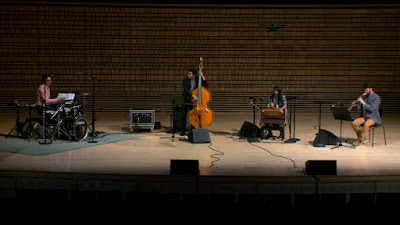Otherly
On the opening track, a long, sustained soprano saxophone
and vocal held note signals but one commitment to the raga-based, harmonium-cored
sound of this jazz quartet, both as band and number of tracks on the album.
The vocalisations are unworded sung sounds that have the
aural equivalent of an exotic language. They are not really mantras because of
the variations, the ups and downs in the melodic lines, as well as the jazz
vocalisations at times which seem to step outside the conventions of a mantra.
It isn’t scatting. I don’t think.
Though it is on second track Treta Yuga, scatting that is [I often review as I listen, so it can
be a malleable walk through – less harmonium on this track, for example, though
more evident near end], the scat and sax dueting adventurously lively. And
mentioning the track name, this relates to Yuga in Hinduism as an epoch or
era within a four age cycle, so the ‘quartet’ having even further significance than
mentioned in passing above, and the four tracks on the album are therefore titled:
Satya Yuga – the age of truth and
perfection; Treta Yuga – in this age,
virtue diminishes slightly; Dvapara Yuga
– in this age, people become tainted with Tamasic qualities and aren't as
strong as their ancestors; Kali Yuga
– the age of darkness and ignorance, [thanks to Wikipedia, and I trust this is
accurate as a snapshot]. There is an element of Terry Riley’s Rainbow… set as recurring rhythm in this
second track.
Third Dvapara Yuga
is a sparser, more sporadic number, and closer Kali Yuga returns to the harmonium-cored playing of the first,
working into a frenzy of Amirtha Kidambi screams and Matt Nelson sax shrieks.
This is wild and wonderful. Where a mantra is a chant to aid concentration,
these are bursts of rant to aid disorientation within whatever calm we might ty
to intermittently achieve. So, this is a musical as well as otherly experience.


No comments:
Post a Comment